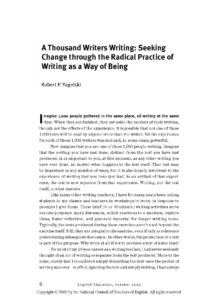A Thousand Writers Writing: Seeking Change through the Radical Practice of Writing as a Way of Being
Excerpt
For most of my 25-year career as a writing teacher, I had never seriously thought of an act of writing as separate from the text produced. More to the point, rarely had I considered simply discarding the text once the period of writing was over—in effect, ignoring the text and simply writing. I had always assumed, like most English teachers I know, that writing should produce a text to be used for some explicit purpose—to keep a record, promote learning, communicate ideas or information, or demonstrate writing ability (as in the context of assessment).
It was not until I attended the opening session of the National Writing Project’s annual conference in 2004 that I began to consider the experience of an act of writing as separate from—and as valuable as—the text produced as a result of that act of writing.
Some 1,000 educators from around the United States gathered in a hotel ballroom in Indianapolis, and they were writing for its own sake. As the new director of a National Writing Project site in Albany, New York, I quickly learned that almost all NWP events, whether local or national, large or small, begin with writing. And almost never is the purpose of that writing to produce a text to be read or used by someone other than the writer. We write—together—for other reasons, because writing as an activity matters, separate from any text that is produced.
In that Indianapolis ballroom, writing was in fact an act of being, an intense awareness of ourselves in that moment: 1,000 individuals writing, together, in a moment in time and space. In this sense, writing is a potentially powerful vehicle for transformation, for it opens up possibilities for awareness, reflection, and inquiry that writing as an act of textual production does not necessarily do. Writing in the moment, I have come to realize, has the capacity to change us.


